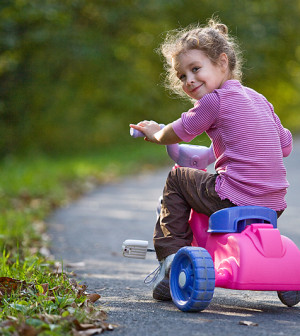- Could Your Grocery Store Meat Be Causing Recurring UTIs?
- Are You Making This Expensive Thermostat Error This Winter?
- Recognizing the Signs of Hypothyroidism
- 10 Strategies to Overcome Insomnia
- Could Artificial Sweeteners Be Aging the Brain Faster?
- Techniques for Soothing Your Nervous System
- Does the Water in Your House Smell Funny? Here’s Why
- Can a Daily Dose of Apple Cider Vinegar Actually Aid Weight Loss?
- 6 Health Beverages That Can Actually Spike Your Blood Sugar
- Treatment Options for Social Anxiety Disorder
Kids Who Aren’t Ready for Kindergarten May Suffer Long-Term Consequences

Children entering kindergarten need to be socially and behaviorally ready for school or they may struggle in later grades, a new study suggests.
“In 2015, kindergarten teachers rated more than half of students behind in social and behavioral skills needed for learning, and it’s painful for the children who want to succeed, but become frustrated and hopeless,” study author Deborah Gross, a professor of mental health and psychiatric nursing at Johns Hopkins University in Baltimore, said in a university news release.
The research included more than 9,000 public school students in Baltimore who were followed from kindergarten to fourth grade.
In the fourth grade, those who began kindergarten behind in social-behavioral development were up to 80 percent more prone to be held back, the study revealed. Kids who weren’t ready for kindergarten were also up to 80 percent more likely to require individualized services and support, the study showed. And, youngsters who were behind in their development when starting kindergarten were up to seven times more likely to be suspended or expelled, according to the study.
Boys were more likely to than girls to be socially and behaviorally unprepared for kindergarten, and to experience all three difficulties in fourth grade, the researchers found.
“These results are important,” Gross said. “They show how critical social and behavioral skills are for learning, how early the struggle begins for young children, and how important it is to address the problem of social-behavioral readiness well before children enter kindergarten,” she explained.
The problem can be tackled through expanded and enhanced early childhood programs and increased support for parents and teachers, according to the researchers.
“These programs may be costly,” study first author Amie Bettencourt said in the news release. “But not addressing the problem of readiness to learn will cost more in the long run. It’s in the best interest of all to invest in strengthening social and behavioral foundations for our kids and for future generations.”
More information
The American Academy of Pediatrics has more on preschool growth and development.
Source: HealthDay
Copyright © 2026 HealthDay. All rights reserved.










